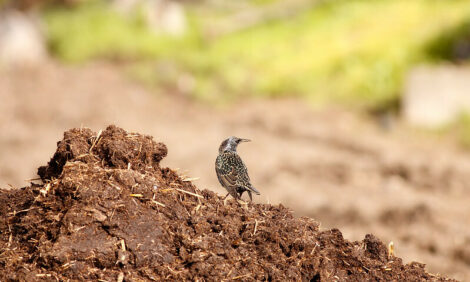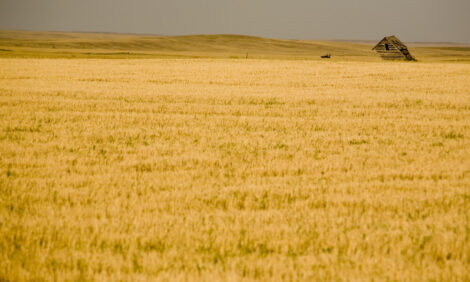



Full of…eggs
UK - With Easter upon us there is no better time to scoff a few eggs, whether they are of the chicken or chocolate variety. For centuries lambs and rabbits have symbolised Easter and springtime but it’s the simple egg that is perhaps the oldest and most universal symbol of rebirth and new life.
The custom of offering eggs dates back well beyond the early years of Christianity to the most ancient pagan traditions. Egyptians and Persians used to dye eggs in spring colours and give them to friends as a symbol of renewed life long before Christ was born.
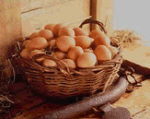
The myths of several cultures maintain that the earth itself was hatched from a giant egg. With the advent of Christianity the symbolism of the egg was adopted to embody the resurrection of Jesus.
It isn’t just a coincidence that Easter corresponds with other cultural and religious spring celebrations. Historically agrarian cultures celebrated seasonal holidays determined by the equinoxes, solstices or lunar cycles, which is similar to how Easter’s date is determined. The date of Easter changes every year. It is calculated to be on the first Sunday after the first full moon of spring and falls between March 22 and April 25.
For Christians, Easter is traditionally seen as a period of sacrifice and contemplation. If Lent is observed, eggs, amongst other foods are not to be eaten for the period between Ash Wednesday and Easter Sunday. This gave rise to the tradition of eating pancakes on Shrove Tuesday – to use up all the eggs before the period of abstinence.
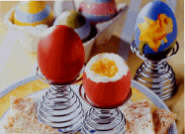 When Lent ended on Easter Sunday, it became custom for people to give decorated eggs. The tradition of dying, painting and decorating eggs has continued through the centuries.
When Lent ended on Easter Sunday, it became custom for people to give decorated eggs. The tradition of dying, painting and decorating eggs has continued through the centuries.
Still the most famous Easter eggs are those made by the 19th century Russian goldsmith Peter Carl Fabergé as an Easter gift from Czar Alexander to his wife. This first Fabergé egg – with an outer shell of platinum, opening to reveal a golden egg that itself opened to reveal a golden chick – was so impressive, that Fabergé was asked to continue and made a total of 57 Easter eggs.
This extravagance obviously doesn’t extend to every one. In modern times the chocolate variety has proved itself as the most popular egg to give (and eat!) at Easter time. Although chocolate is bound to remain the favourite kind of egg for the sweet tooth amongst us, why not enjoy an Easter feast this year that also incorporates fresh British eggs. One of the most versatile foods, eggs can make a meal out of nothing or act as the foundation to an exquisite dish or dessert.
Frittata, egg fried rice, quiche, and omelettes to name just a few are all quick, easy and nutritious meal ideas. Delectable salads such as Caesar salad and Nicoise feature eggs to give them that special edge.
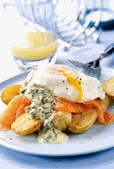
Why not treat yourself to a tasty Easter breakfast with eggs Benedict? Simply poach an egg and serve with bacon and hollandaise sauce on fresh thick toast. Or for eggs Benedict New York use salmon instead of bacon.
Using fresh eggs doesn’t have to involve compromising the sweet tooth. So many classic desserts including soufflé, custard and custard tarts, pavlova, chocolate mousse to name just a few are all reliant on eggs.
The British Egg Information Service, set up by the British Egg Industry Council, provides an array of recipe ideas to choose from or to help inspire your own creations.
THEY’RE HEALTHY TOO
The average person in the UK consumes approximately 174 eggs per year. This is good news for our health as eggs (unfortunately not chocolate ones) are packed full of nutrients and can play a valuable role in a balanced diet. Look for the Lion Quality mark to ensure your eggs meet the highest quality standards.
Eggs are particularly beneficial to our health as they contain all the essential amino acids needed by the human body. Accounting for approximately 12.5 per cent of an eggs weight, they are an excellent source of protein as it is found in both the yolk and albumen (white). In addition, eggs are a great source of vitamins and minerals including all the B vitamins and types of vitamin A, D and E. Eggs contain the minerals iodine, phosphorus, zinc, calcium and iron that are essential for good health.
An egg is goodness in a shell. It is a universal symbol of spring and new life. It is nature’s pre-packaged bundle of energy and nutrition. Happy Easter and happy eating!
Source: National Farmers' Union - 8th April 2004







